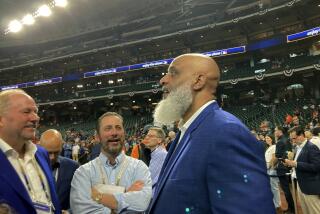Decision to End Baseball Season Is Postponed
- Share via
NEW YORK — Baseball acting commissioner Bud Selig on Friday delayed a decision on canceling the remainder of the 1994 strike-bound season even though a proposal from the players union--made amid increased optimism a day earlier--was rejected by the owners.
On Day 29 of the players’ strike, the owners’ negotiating committee said the proposal failed to achieve the cost certainty that the owners believe is possible through the salary cap proposal they delivered to the players on June 14 and which remains on the bargaining table. The salary cap is steadfastly opposed by the players union.
Selig, owner of the Milwaukee Brewers, arrived in New York on Friday and said he would not enforce his tentative Friday deadline for reaching a settlement or canceling the season, choosing instead to make that decision early next week.
“I’m very patient and very cautious, and I’ve said all along that common sense will prevail,” Selig said of the deadline. “I’m willing to bend over backward (in pursuit of an agreement), but at some point we have to establish common ground, and tragically we’ve been unable to do that.”
There are no negotiating sessions scheduled over the weekend, but lawyers for both sides are expected to meet this morning to review the situation and possibly re-examine the players’ proposal in relationship to a similar proposal the owners have discussed.
Don Fehr, the union’s executive director, said it becomes “progressively harder with each passing day” to think in terms of saving the season, along with the playoffs and World Series, “but we won’t shut the door until they shut it. The only thing positive about today was that they didn’t do that.”
However, Eugene Orza, the union’s associate general counsel, said that unless there was positive movement in the negotiations in the next 72 to 96 hours, it would be impossible to resume play.
The World Series has been conducted annually since 1904, surviving a Depression, two World Wars and the 1989 Bay Area earthquake.
“Nobody dreads these circumstances or is more dismayed by them than I am,” Selig said. “But as horrifying and heartbreaking as the short-term pain is, the long-term pain of not dealing with our economic problems would be far worse. Those problems have been repressed for too long.”
The owners’ response to the escalation of salaries and a revenue disparity among the clubs that they claim has left several smaller market franchises in economic peril has been the salary cap proposal they are expected to implement unilaterally if negotiations fail to produce a settlement.
The union contends that the owners’ proposal would place an artificial ceiling on salaries, destroy free agency and transfer millions of dollars from the players to owners.
It was after a week of behind-the-scenes conversations between union officials and some club executives--primarily Colorado Rockies owner Jerry McMorris, Boston Red Sox chief executive officer John Harrington and Atlanta Braves President Stan Kasten--that the union developed the proposal they made on Thursday, raising a degree of hope that seemed to be dashed just a day later.
The key provision in the union proposal called for a 1 1/2% tax on the payrolls and revenues of the 16 highest revenue clubs. The collected tax would be redistributed to the other 12 clubs, helping to balance the alleged disparity. Owners claimed Friday that $50 million--based on 1994 projections before the strike--would be redistributed by the players plan compared to $70 million through the owners’ salary cap proposal.
Both Selig and the owners’ chief negotiator, Richard Ravitch, who has reportedly fallen into disfavor among some owners and seemed to have been moved out of the daily process by the recent involvement of McMorris, Harrington and Kasten, said in a news conference that the proposal failed to restrict salary growth, provide the owners with cost certainty or draw a link between revenue and salaries, as the cap does.
“It’s the same stuff we’ve been hearing for generations,” said Fehr, convinced that the owners’ ongoing goal is to destroy free agency through the unilateral implementation of their salary cap. “Nothing we have said or done in these negotiations has mattered. All they preach is the salary cap.”
Fehr said he was hopeful the owners would re-examine the proposal and see the merit in it, insisting the tax provides cost containment by penalizing the higher payrolls. He acknowledged, however, that to raise it in an attempt to increase the amount of revenue being shared by the big and small markets would be an impediment to clubs signing high salaried free agents.
The owners have discussed a similar tax plan, but the tax would be levied after a payroll reached a designated ceiling, which the union contends is the equivalent of a cap.
“We both have tax concepts on the table, and there ought to be a way to work with the concepts and formulas to find a solution,” said McMorris.
Harrington and Kasten are remaining in New York to work on that. McMorris was scheduled to leave today, and Selig, who met with Fehr later Friday to reaffirm a sense of hope and urgency regarding their quest for a solution, was scheduled to leave this morning.
More to Read
Are you a true-blue fan?
Get our Dodgers Dugout newsletter for insights, news and much more.
You may occasionally receive promotional content from the Los Angeles Times.









